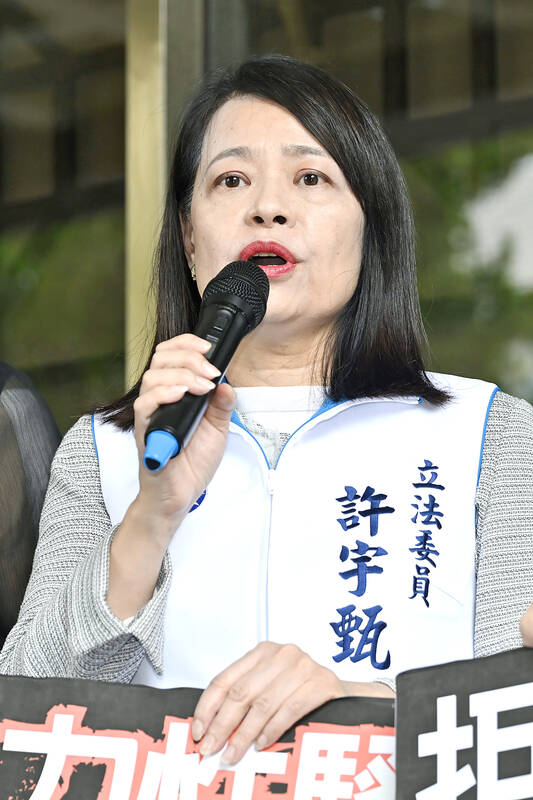A Chinese Nationalist Party (KMT) lawmaker yesterday said President William Lai (賴清德) should convene a national affairs advisory meeting that would include opposition leaders, in a bid to help resolve the legislative and public controversy over a series of reform bills.
If Lai decides to convene such a meeting, he should invite KMT Chairman Eric Chu (朱立倫) and Taiwan People’s Party (TPP) Chairman Ko Wen-je (柯文哲), KMT caucus deputy secretary-general Hsu Yu-chen (許宇甄) said.
Hsu made the suggestion after Democratic Progressive Party (DPP) caucus whip Ker Chien-ming (柯建銘) called for cross-party discussions in the legislature to establish game rules for the passage of bills.

Photo: Chen Chih-chu, Taipei Times
Lawmakers of the governing and opposition parties have been at loggerheads for the past few weeks over a series of legislative reform bills that were put forward by opposition parties to expand the legislature’s power of oversight with regard to the president and the executive branch of the government.
Hsu yesterday said that while Taiwanese voters in January gave the DPP a record third consecutive term electing Lai as president, they opted not to return the DPP to its absolute majority in the 113-seat legislature.
That decision gave the KMT and the TPP the role of supervising the ruling party, Hsu said, referring to the two opposition parties’ combined 60 seats in the Legislature.
The KMT holds 52 seats, the TPP eight and the DPP 51, while two independent legislators are politically aligned with the KMT.
Against that backdrop, the KMT and the TPP put forward their versions of the legislative reform bills on government oversight, Hsu said.
Contrary to what the DPP has said, there were no underhand operations to circumvent the normal deliberation and review process of the bills, Hsu said, adding that the real problem is that the DPP does not want to be supervised.
When the DPP was in opposition, it proposed legislative reform bills that were much stiffer than those currently under review, she said.
Now that the DPP has been in power for so many years, it does not want supervisory reforms, she added.

Eight restaurants in Taiwan yesterday secured a one-star rating from the Michelin Guide Taiwan for the first time, while three one-star restaurants from last year’s edition were promoted to two stars. Forty-three restaurants were awarded one star this year, including 34 in Taipei, five in Taichung and four in Kaohsiung. Hosu (好嶼), Chuan Ya (川雅), Sushi Kajin (鮨嘉仁), aMaze (心宴), La Vie by Thomas Buhner, Yuan Yi (元一) and Frassi in Taipei and Front House (方蒔) in Kaohsiung received a one-star rating for the first time. Hosu is known for innovative Taiwanese dishes, while Chuan Ya serves Sichuan cuisine and aMaze specializes

STATS: Taiwan’s average life expectancy of 80.77 years was lower than that of Japan, Singapore and South Korea, but higher than in China, Malaysia and Indonesia Taiwan’s average life expectancy last year increased to 80.77 years, but was still not back to its pre-COVID-19 pandemic peak of 81.32 years in 2020, the Ministry of the Interior said yesterday. The average life expectancy last year increased the 0.54 years from 2023, the ministry said in a statement. For men and women, the average life expectancy last year was 77.42 years and 84.30 years respectively, up 0.48 years and 0.56 years from the previous year. Taiwan’s average life expectancy peaked at 81.32 years in 2020, as the nation was relatively unaffected by the pandemic that year. The metric

Taiwan High Speed Rail Corp. (THSRC) plans to ease strained capacity during peak hours by introducing new fare rules restricting passengers traveling without reserved seats in 2026, company Chairman Shih Che (史哲) said Wednesday. THSRC needs to tackle its capacity issue because there have been several occasions where passengers holding tickets with reserved seats did not make it onto their train in stations packed with individuals traveling without a reserved seat, Shih told reporters in a joint interview in Taipei. Non-reserved seats allow travelers maximum flexibility, but it has led to issues relating to quality of service and safety concerns, especially during

A magnitude 5.1 earthquake struck Chiayi County at 4:37pm today, the Central Weather Administration (CWA) said. The hypocenter was 36.3km southeast of Chiayi County Hall at a depth of 10.4km, CWA data showed. There were no immediate reports of damage resulting from the quake. The intensity of the quake, which gauges the actual effect of a seismic event, measured 4 in Chiayi County, Tainan and Kaohsiung on Taiwan's seven-tier intensity scale, the data showed. The quake had an intensity of 3 in Chiayi City and Yunlin County, while it was measured as 2 in Pingtung, Taitung, Hualien, Changhua, Nantou and Penghu counties, the data